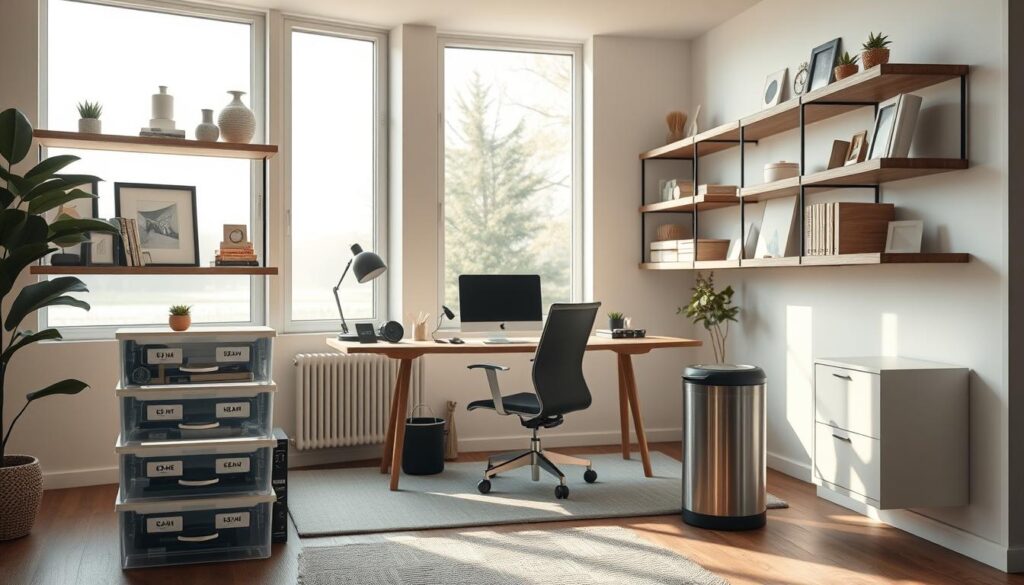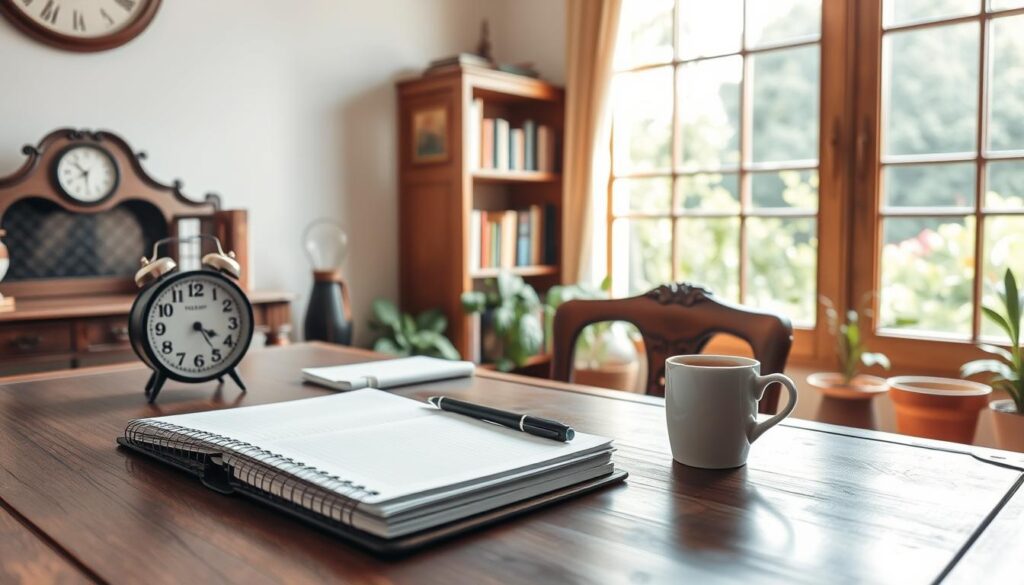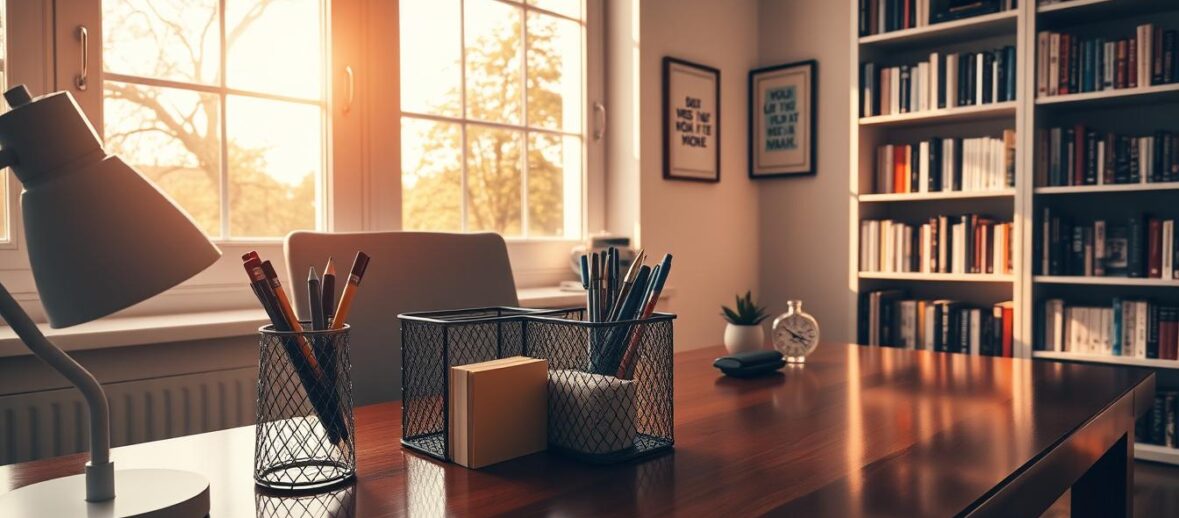Feeling overwhelmed by clutter and disorganization? You’re not alone. Many of us struggle to manage our time effectively and keep our lives in order. Being organized is more than just a virtue; it’s a key to reducing stress and boosting productivity. When you’re organized, you’re less likely to miss important tasks and more likely to achieve your goals.
By implementing simple time management techniques and organization tips, you can simplify your life and create a more peaceful living and working environment. In this article, we’ll explore practical strategies to help you get organized and stay on track.
Key Takeaways
- Simple strategies to simplify your life and reduce stress
- Effective time management techniques to boost productivity
- Practical organization tips for a more peaceful home
- Benefits of being organized, including reduced stress and improved productivity
- Easy-to-implement methods to get and stay organized
The Psychology of Organization
Being organized is more than just using the right tools. It’s also about understanding the psychological reasons behind your actions. Knowing why you struggle with organization and its benefits can help you adopt better habits.
Why We Struggle with Staying Organized
Many people find it hard to stay organized due to psychological barriers. Recognizing these challenges is the first step to overcoming them.
The Benefits of an Organized Life
Organizational habits can greatly improve your life. They lead to less stress and better productivity.
Reduced Stress and Anxiety
Being organized means you always know where things are. This reduces stress and anxiety from searching for lost items or dealing with clutter.
Improved Productivity and Focus
Organization also boosts your focus and productivity. By prioritizing tasks and managing your time well, you can do more in less time. This leaves room for other activities.
| Benefits of Organization | Impact on Daily Life |
|---|---|
| Reduced Stress | Less anxiety, better mental health |
| Improved Productivity | More efficient use of time, achieving more |
| Better Focus | Enhanced ability to concentrate on tasks |
Understanding the psychology of organization and using effective strategies can lead to a more organized, productive, and less stressful life. Developing prioritization skills and applying productivity hacks can greatly improve your organizational abilities.
How to Stay Organized: The Fundamental Principles
To stay organized, it’s key to know the basic principles. These principles can change your daily life for the better. They help you create a structured daily routine and lower stress levels.
The “One Touch” Rule
The “one touch” rule is a simple yet powerful way to manage tasks and papers. It means dealing with each item once and making a decision right away.
Implementing This Rule in Daily Life
To use the “one touch” rule, sort your tasks and papers into groups. Then, handle each item quickly. You can finish the task, file it, or throw it away if it’s not needed. This method keeps clutter away and saves time.
The 2-Minute Rule
The 2-minute rule is another helpful principle. It says to do tasks that take less than 2 minutes right away.
Tasks You Can Complete Right Away
Doing small tasks immediately helps avoid putting things off. It keeps your to-do list short. Examples include answering quick emails, filing papers, or making short calls.
Creating Systems That Work for You
It’s important to make systems that fit your needs. This means figuring out what you need and finding ways to meet those needs.
Personalized Organization Methods
To make good systems, think about your work style and preferences. Also, consider the tasks you handle. Try out different decluttering strategies and tools until you find what suits you best.
Daily Habits of Highly Organized People
Want to be more productive? Learn from people who are highly organized. They have routines that keep them on track and their homes clutter-free.
Morning Routines That Set You Up for Success
Starting your day right is key. Organized folks start with a morning routine. This includes planning and prioritizing tasks.
Evening Reset Rituals
An evening routine is just as vital. It helps you relax and get ready for tomorrow.
Consistency Is Key: Building Organizational Habits
Being consistent is essential for good habits. Regularly doing your routines makes them automatic.
Habit Stacking for Organization
Habit stacking is a clever trick. It adds new habits to ones you already have. For instance, planning your day after making coffee.
| Habit | Existing/New | Benefit |
|---|---|---|
| Morning Planning | New | Increased productivity |
| 10-Minute Cleanup | New | Clutter-free home |
| Coffee Making | Existing | Boosts morning routine |
Decluttering Strategies That Actually Work
To live a more organized life, you need good decluttering strategies. Decluttering is more than getting rid of stuff. It’s about making a space that boosts productivity, relaxation, and happiness. Using the right decluttering techniques can greatly improve your life.

The Four-Box Method
The Four-Box Method is a simple yet effective way to declutter. It sorts items into four groups: keep, donate, store, or trash.
Keep, Donate, Store, or Trash
With the Four-Box Method, you make quick decisions on each item. Ask if it’s useful, sentimental, or joyful. If not, it might go to donation or the trash. Be ruthless – fewer possessions mean less to maintain and organize.
Zone Cleaning Approach
The Zone Cleaning Approach is another great strategy. It divides your space into smaller areas, focusing on one at a time.
Breaking Down Spaces Into Manageable Areas
Dividing your space into zones makes decluttering easier and less overwhelming. Start with busy or stressful areas and work through each zone step by step.
Digital Decluttering Techniques
In today’s world, decluttering isn’t just about physical spaces. It’s also about your digital life. Digital clutter can be overwhelming, so managing your digital space is key.
Organizing Files, Photos, and Emails
Begin by organizing your computer files into labeled folders and deleting unnecessary documents. Sort through digital photos, keeping only the best and deleting duplicates or poor-quality images. Regularly cleaning out your email inbox also helps reduce digital clutter and boosts productivity.
Managing Digital Subscriptions
Review your digital subscriptions, like streaming services, software, and newsletters. Cancel any you no longer use or that don’t add value. This reduces digital noise and helps you focus on what’s important.
Creating an Organized Home Environment
An organized home is more than a dream; it’s achievable with the right strategies. It’s not just about tidying up. It’s about a structured approach for every room and part of your home.
Room-by-Room Organization Tips
Different rooms need different organization strategies. Let’s look at some tips for key areas of your home.
Kitchen Organization Essentials
The kitchen is the heart of the home. Keeping it organized is key for efficiency and fun. Start by clearing countertops and organizing utensils and ingredients.
Use a utensil organizer or spice rack to keep things handy.
Bedroom and Closet Systems
A well-organized bedroom is a sanctuary. Focus on a clutter-free closet with dividers, double rods, and shelf organizers. Keep bedside tables simple with only essentials.
Consider a small tray for your phone, watch, and reading.
Bathroom and Living Space Solutions
In the bathroom, use over-the-toilet shelving, cabinet organizers, and a shower caddy for storage. For the living room, baskets, ottomans with storage, and a media console help keep clutter away.
Storage Solutions That Maximize Space
Effective storage is crucial for an organized home. The right solutions help keep belongings organized and your home clutter-free.
Vertical Storage Options
Use your walls with tall shelving units, wall-mounted cabinets, and hanging organizers. This is great for small spaces where floor area is limited.
Multi-functional Furniture
Invest in furniture that serves more than one purpose. Look for storage ottomans, beds with drawers, and coffee tables with storage.
Maintaining Order Once You’ve Established It
Keeping an organized home needs regular upkeep. Set up daily, weekly, and monthly tasks to stay clutter-free.
Daily, Weekly, and Monthly Maintenance Tasks
| Frequency | Tasks |
|---|---|
| Daily | Quick pick-up of clutter, wiping down kitchen counters |
| Weekly | Vacuuming or sweeping, laundry, organizing cluttered areas |
| Monthly | Deep cleaning of bathrooms and kitchen, organizing closets |
By doing these tasks regularly, you’ll keep your home organized and enjoy a more structured daily routine.
Time Management Techniques for Better Organization
To stay organized, learning time management techniques is key. These skills help you prioritize, manage your work, and reach your goals.
Time Blocking for Productivity
Time blocking schedules big chunks of time for important tasks. This method helps you avoid distractions and work more efficiently.
Prioritization Methods
Prioritizing tasks is vital in time management. It ensures you focus on the most critical tasks that yield the best results.
Avoiding the Multitasking Trap
Multitasking can harm productivity. By focusing on one task, you can deliver better quality work.
Single-Tasking Strategies
Single-tasking means focusing on one task without distractions. Use tools like website blockers to stay on track.

Teaching Kids to Be Organized
Teaching kids to be organized is key to their daily life and future success. It’s not just about cleaning up. It’s about teaching life skills that last a lifetime.
Age-Appropriate Organization Skills
Teaching organization varies by age. Here’s how:
Toddlers and Preschoolers (2-5 years)
At this age, kids can learn simple skills like putting away toys. Using color-coded bins makes it fun and easy for them.
Elementary School Children (6-12 years)
As kids grow, they can handle more. Encourage them to use a planner or calendar for school work.
Teenagers (13-18 years)
Teenagers need advanced skills like time blocking and task prioritizing. This helps them manage their busy lives.
Making Organization Fun and Rewarding
Make organization a game to keep kids interested. For example, create a challenge to see who can keep their room clean longest.
Games and Challenges for Kids
- Create a “treasure hunt” for lost items.
- Set up a reward system for keeping spaces organized.
Creating Kid-Friendly Systems
Use visual cues and easy-to-reach storage for kids.
Visual Cues and Color Coding
Labels and color coding help kids quickly find where things go.
Accessible Storage Solutions
Make sure storage is easy for your child to use. Use low shelves or bins with handles.
| Age Group | Organization Skill | Tools |
|---|---|---|
| 2-5 years | Putting away toys | Color-coded bins |
| 6-12 years | Using a planner | Planners or calendars |
| 13-18 years | Time blocking | Digital calendars or apps |
By teaching these organization tips in a fun way, you help kids develop productivity hacks for life.
Essential Tools and Resources for Organization
In today’s fast-paced world, staying organized is key. The right tools can make a big difference. You need physical tools, digital apps, and planners that fit your needs for a structured daily routine.
Physical Organization Tools
Physical tools are the foundation of a tidy workspace or home. They help sort and store items, making them easy to find.
Storage Containers and Labels
Storage containers and labels are great for keeping things in order. Labels make it easy to know what’s inside, saving time and reducing mess.
Drawer Dividers and Shelf Organizers
Drawer dividers and shelf organizers maximize storage. They keep items separate, preventing clutter from coming back.
Digital Apps and Software
In today’s digital world, productivity hacks often use technology. Digital apps and software are key to staying organized.
Task Management Applications
Task management applications like Trello and Asana are essential. They let you organize tasks and track progress on boards, lists, and cards.
Calendar and Reminder Systems
Calendar and reminder systems keep you on track. Google Calendar and Apple Calendar are popular for managing your schedule.
Planners and Productivity Systems
For those who like a traditional or hybrid approach, planners and productivity systems are vital. They offer a hands-on way to plan daily tasks and long-term goals.
Bullet Journaling
Bullet journaling is a customizable, creative way to organize. It lets you personalize your planning.
Digital vs. Paper Planning
The choice between digital vs. paper planning depends on personal preference. Some like digital tools for their flexibility, while others prefer paper for its feel.
Using these tools and resources can help you achieve a more structured daily routine and boost productivity. As Benjamin Franklin said,
“A place for everything, and everything in its place.”
This advice highlights the importance of organization in our daily lives.
Simplifying Your Life Through Organization
Getting organized can make your life easier. It helps you get rid of clutter, save time, and feel less stressed. This part will show you how to live simply by being more organized.
Adopting a Minimalist Mindset
Being a minimalist means focusing on what matters most to you. It’s not about getting rid of everything. It’s about keeping only what adds value to your life.
Quality Over Quantity is key in minimalism. Choosing quality over quantity helps you avoid clutter and makes life easier.
Quality Over Quantity
Choosing quality means you’ll keep and care for items that are meaningful or useful. This reduces the need for constant replacements and helps manage clutter.
Creating Routines That Reduce Decision Fatigue
Decision fatigue can really drain your energy. By setting routines, you can make regular tasks automatic. This means you won’t have to make as many decisions every day.
Automating Regular Tasks
Automating tasks like paying bills or doing chores saves time and mental energy. Use technology to set up automatic reminders and payments.
Setting Boundaries to Prevent Overwhelm
Setting boundaries is key to a simpler life. It means learning to say no to things that aren’t important and delegating tasks when you can.
Learning to Say No
Saying no to things that don’t fit your priorities or values is crucial. It helps you protect your time and energy for what’s truly important.
Delegating and Outsourcing
Find tasks you can delegate to others, like family members or professionals. Outsourcing tasks like lawn care or cleaning can also give you more time for what’s important.
Conclusion: Your Journey to an Organized Life
You now have a complete guide to staying organized. You’ve learned about the “One Touch” Rule and the 2-Minute Rule. You also know about daily habits and decluttering strategies.
These tips and techniques can make your life simpler, reduce stress, and increase productivity. Staying organized is more than just cleaning up or using the right tools. It’s about creating systems that fit your life and family.
Whether you’re teaching kids or adopting a minimalist lifestyle, find what works for you. Stick to it and see the difference it makes.
Start using these strategies today. Begin with small steps and be consistent. You’ll see how these simple tips can change your daily life and improve your well-being.

